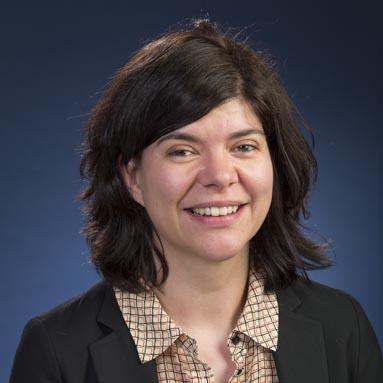
SDG 2: Zero Hunger - End hunger, achieve food security and improved nutrition and promote sustainable agriculture


I joined WPI in 2011 as a scholar and teacher with training in public health, environmental policy, and international development studies. My research and teaching interests focused on the environment-development nexus, where tensions between sustainability and livelihoods often lead to contentious policy debates. My work on soy production and land inequality, expert roundtables and certification, and sustainability rating systems for cities, advanced ideas around how global discourses about sustainable agriculture and sustainability indicators take shape, are mobilized, and have influence at the local level, impacting social, political, and environmental systems.
My recent work addresses how broad policy frameworks and approaches, even those intended to redress inequality, can exacerbate disadvantage and systemic inequalities. How, for example, can technologies that are developed and deployed in the service of the ‘public interest’ ultimately serve to reinforce conscious and unconscious bias and embed bias in social institutions? How might ‘Rights of Nature’, an emergent environmental ideal advanced by international advocacy networks, re-create neo-colonial modes of disenfranchisement? How can scientists and policymakers understand and help people manage the risks associated with climate change and build support for equitable energy transitions and a just and greener economy?
In 2020, I expanded my interest in the politics of expertise (2012, 2018) by collaborating with Yunus Telliel and other colleagues to leverage WPI’s membership in the national-level Public Interest Technology University Network (PIT-UN). We identified PIT as an effective and meaningful way to engage social justice issues within the context of WPI’s engineering and technical mission. With a PIT-UN grant, we have helped to shape the interdisciplinary conversation at WPI and beyond about the complex ways in which technology in the so-called ‘public interest’ can produce socially just and unjust outcomes, and then bring that conversation back to the national level through the University Network. We are further institutionalizing PIT at WPI by convening the ‘Just-T Collab’ – a collaborative of students, scholars, and activists concerned with, and engaged in issues the technology-justice interface.
Drawing on my work on environmental politics in Paraguay again in 2021, I joined Charmain Levy (Université du Québec en Outaouais) and Valerie L’Heureux (Concordia University) - esteemed scholars of Paraguayan society and politics - to propose and develop an edited volume on social movements in Paraguay. Paraguay is an underexamined, yet remarkably interesting country, where war, dictatorship, and lack of state accountability and transparency have produced cycles of mobilization and repression. Under such conditions, people rely on social movements for political voice. This volume brings together scholars, activists, and practitioners, many of whom are Paraguayan and have decades of experience in social critique and community organizing. They reflect on movements in the areas of peasant and agrarian rights to land and livelihoods, LGBTQ+ and feminist struggles for recognition, the struggles of labor unions to win workers’ rights, and student movements for access to quality education. The proposal has been accepted by Palgrave (contract forthcoming), with a deadline of September 2022.
Visit Digital WPI to view student projects advised by Professor Elgert.
SDG 2: Zero Hunger - End hunger, achieve food security and improved nutrition and promote sustainable agriculture

SDG 4: Quality Education - Ensure inclusive and equitable quality education and promote lifelong learning opportunities for all

SDG 6: Clean Water and Sanitation - Ensure availability and sustainable management of water and sanitation for all

SDG 10: Reduced Inequalities - Reduce inequality within and among countries

SDG 11: Sustainable Cities and Communities - Make cities and human settlements inclusive, safe, resilient and sustainable

SDG 12: Responsible Consumption and Production - Ensure sustainable consumption and production patterns

SDG 15: Life on Land - Protect, restore and promote sustainable use of terrestrial ecosystems, sustainably manage forests, combat desertification, and halt and reverse land degradation and halt biodiversity loss

SDG 16: Peace, Justice, and Strong Institutions - Promote peaceful and inclusive societies for sustainable development, provide access to justice for all and build effective, accountable and inclusive institutions at all levels

Professor Elgert's research focuses on sustainable development, science and technology studies, and interpretive and critical policy analysis.
Featured works:
Levy, C., Elgert, L. L’Heureux, V. (Eds) (under contract). Social Movements and Contemporary Social Change in Paraguay. Palgrave.
Elgert, L. (under review). Do-gooders, Tyrants, and Anti-politics: Experts in Development from post-war to post-development.
Gray, L., Elgert, L., WinklerPrins, A. (2020). Theorizing Urban Agriculture: North-South Convergence. Agriculture and Human Values, 37, 869-883.
Elgert, L. (2019).Promoting Global Competency in Engineering Education: Designing the ‘Engineering Across Borders’ Casebook. ASEAN Journal of Engineering Education, 3(1), 17-26.
Elgert, L. (2018). Rating the sustainable city: ‘Measurementality’, transparency, and unexpected outcomes at the knowledge-policy interface. Environmental Science & Policy, 79, 16-24.
Elgert, L. (2016). The double edge of cutting edge: explaining adoption and non-adoption of the STAR rating system and insights for sustainability indicators. Ecological Indicators, 67: 556-564.
Elgert, L. (2015). ‘More Soy on Fewer Farms’ in Paraguay: Challenging Neoliberal Agriculture’s Claims to Sustainability. Journal of Peasant Studies, 43(2):537-561.